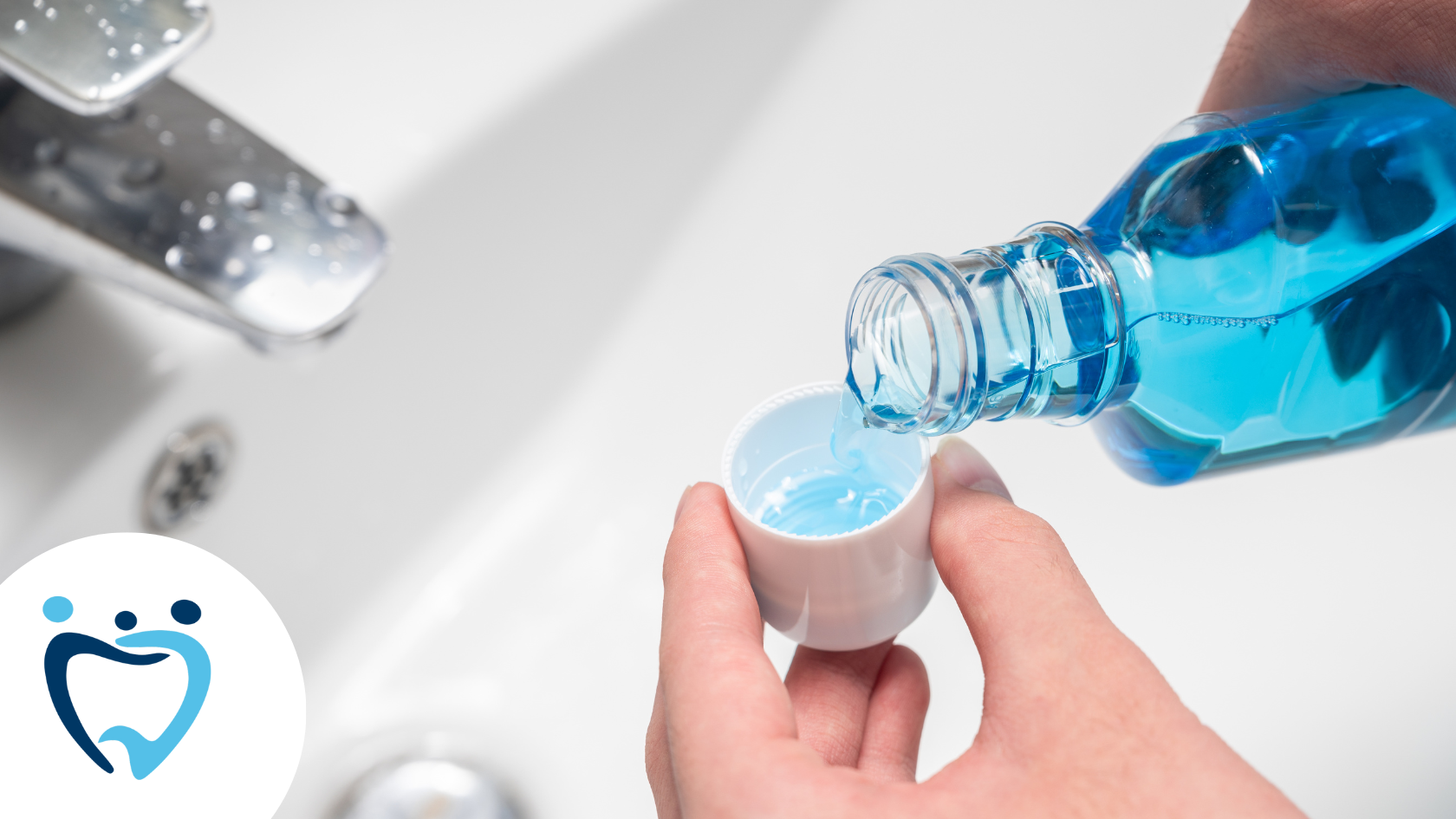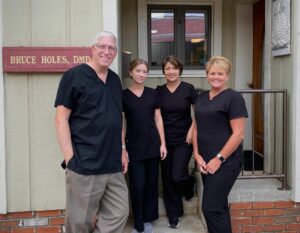
01 Aug Is Mouthwash Really Necessary?
Picture it: you’ve scrubbed your teeth clean through brushing, gotten to every crevice by flossing, and now you feel the minty burn of mouthwash as you swish it around in your mouth. When you spit it out, your mouth is left squeaky clean and minty fresh. Sounds good, doesn’t it? Mouthwash is nice for those of us who like to be thorough—but is it really an essential part of your oral health routine?
The truth is, mouthwash is an excellent addition to your daily oral health routine. However, it’s no replacement for brushing and flossing. While there are many different options on the market, the brand isn’t the most important thing to look for—it’s the type of mouthwash that matters. We’ll explore these ideas and other mouthwash-related thoughts below.
The big Question: Is Mouthwash Necessary?
The short answer: no. Mouthwash—also known as oral rinse—isn’t necessary in and of itself.
To understand this, we need to consider the role mouthwash plays. Many people use mouthwash because they enjoy the invigorating sensation it gives after flossing and brushing. But an oral rinse’s job isn’t primarily to provide you with minty breath. It’s to act as the finishing touch on your oral hygiene routine, rinsing out any harmful bacteria and debris. In some cases, these remnants may have been missed by brushing and flossing. In others, they may have been loosened up, and oral rinse is the final step in getting rid of it.
So, yes, this is excellent for your oral health. However, we have to note that water does the exact same thing. (And water is free.) Still, if you opt for an oral rinse, there may be other benefits that come along with it, depending on the ingredients. Research has demonstrated that mouthwash does contribute to plaque and gingivitis prevention. Some oral rinses even include fluoride, a crucial mineral that strengthens your enamel and fights cavities. This is highly beneficial. For instance, one study cited by Healthline found that school-aged children who used fluoride mouthwash lowered the number of cavities by more than 50% in comparison with their peers who did not use mouthwash! (Healthline) While it’s certainly not necessary, because of these added benefits, you are still likely better off if you opt for mouthwash over water.
Types of Mouthwash
The ADA breaks mouthwash down into two types — cosmetic and therapeutic. It’s up to the FDA to designate whether a mouth rinse is cosmetic, therapeutic, or both. The main benefit of cosmetic mouthwash is to freshen your breath. They don’t usually have any other special additives or benefits beyond that.
Therapeutic mouthwash, on the other hand, can provide multiple benefits thanks to its chemical and biological additives. This is even true when it comes to freshening your breath. For instance, cosmetic mouthwash masks your bad breath, but therapeutic mouthwash kills the bacteria that causes bad breath in the first place.
Therapeutic mouthwash can address a host of oral health issues, including:
- Dry mouth
- Gingivitis
- Cavities
- Pain relief
- Whitening
- Dry socket
Dry Mouth
Also known as xerostomia, dry mouth is a reduction in the amount of saliva that you produce. A lack of saliva can increase your chance of cavities, so mouthwash with fluoride to fight those cavities would be ideal. You’ll want to avoid brands with alcohol, since they are prone to dry out your mouth and worsen your condition.
Gingivitis
Gingivitis, an early form of gum disease, is a bacterial infection that can have huge repercussions for your entire mouth. It’s best to treat the infection in its early stages when it can still be controlled with good oral hygiene and regular dental appointments. Using an oral rinse specifically tailored to reduce gingivitis-causing plaque in your mouth would benefit you.
Cavities
Some oral rinses can help fight or even reverse tooth decay with remineralization—the process by which your teeth regain the essential minerals, such as fluoride, that they’ve lost due to decay. When looking for a mouthwash to prevent cavities, choose one with active ingredients such as cetylpyridinium or chlorhexidine. Keep in mind that cetylpyridinium and chlorhexidine may cause staining, so speak to your dentist before using.
Pain Relief
Your dentist may recommend a special type of mouthwash if you’re experiencing oral pain. These contain anesthetics such as benzocaine and lidocaine to alleviate pain and discomfort. Please note, these mouthwashes may require a prescription from your dentist.
Whitening
Some therapeutic mouthwashes have been formulated to help whiten your teeth. However, if you need quick results, you may want to start with another method, such as whitestrips or in-office whitening. It will take much longer to see the effects of mouthwash than some of the other options available through our office.
Dry Socket
Dry socket (alveolar osteitis) is a common issue following having your wisdom teeth removed. It occurs when the naturally-forming clot following an extraction is dislodged. This can result in intense pain a couple of days after your procedure.
Mouthwashes containing chlorhexidine have been shown to be effective in preventing this problem. But again, please note, this kind of oral rinse will likely require a prescription from your dentist.
How to Use Mouthwash
Different types of mouthwash may be more effective when added to your routine in a certain order. Make sure to read the instructions first and follow them closely. With that said, it’s most common to save it for the end of your oral care routine—a finishing touch.
To get the most out of your mouthwash:
- Floss between your teeth
- Brush
- Rinse with mouthwash
It doesn’t take a lot to get the job done—3 to 5 teaspoons ought to do it. Fortunately, you don’t have to keep a teaspoon in your bathroom. Most bottles of mouthwash have a line in the cap indicating how much to use.
When Can I Use My Oral Rinse?
Mouthwash can be used just about any time. It’s best to use it when you have time to complete your entire oral care routine. For example, you should be flossing at least once a day after eating. If you floss right before you go to bed, then that would be the optimal time to include mouthwash.
Of course, you don’t only have to wait until you brush and floss. Mouthwash can come in handy if you’ve had a delicious but strongly seasoned meal, or if you use tobacco and don’t want that odor wafting off your breath. Keep in mind that quitting tobacco would greatly reduce your need for mouthwash in the first place and improve your overall dental health.
Is mouthwash safe?
Before we conclude, let’s address a concern some people have: they have heard over the years that mouthwash may be connected to oral cancer. This is because alcohol is a risk factor for oral cancer and it’s an active ingredient in many types of mouthwash.
Fortunately, the research doesn’t confirm this fear. An analysis of previous studies found no “significant association” between oral cancer and its use. It still poses a danger if swallowed, so make sure that you always spit it out when you’re done swishing. If used properly, it is a safe and helpful oral hygiene tool.
In closing, mouthwash can be a great addition to your daily oral care routine. However, it’s no replacement for brushing and flossing. It comes in two types—cosmetic and therapeutic. Talk to your dentist about which would suit your needs best. Make sure to follow the instructions when using it and never swallow. When used properly, oral rinses are safe and have no connection to oral cancer. If you want that satisfying finishing touch, consider adding it to your routine today.

About Our Team
Our team at Washington Family Dental has over 30 years of experience in the field of dentistry and a reputation for excellent patient care.
Read more about our team here. Ready to book your appointment? Contact us here.
